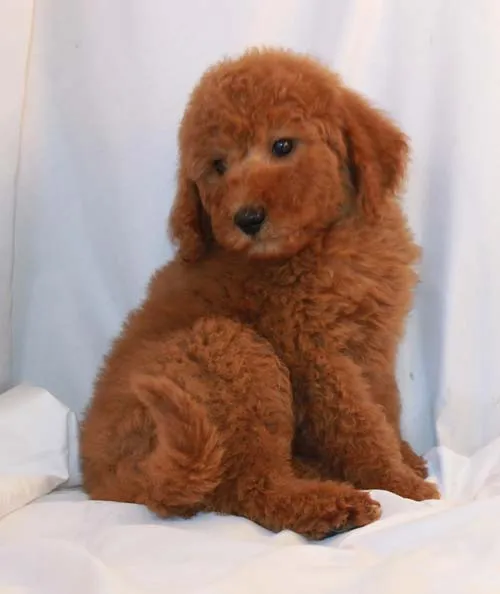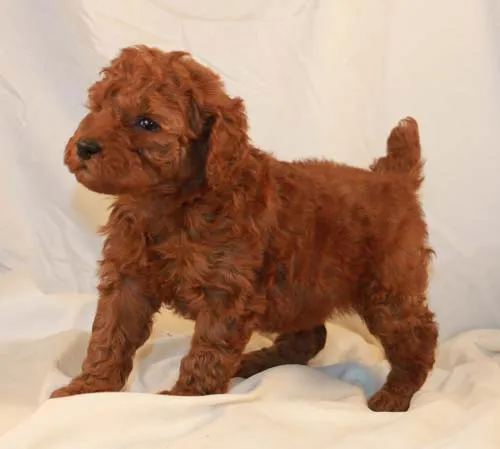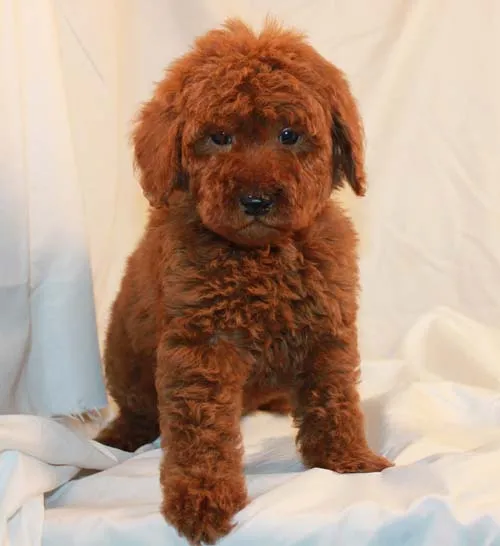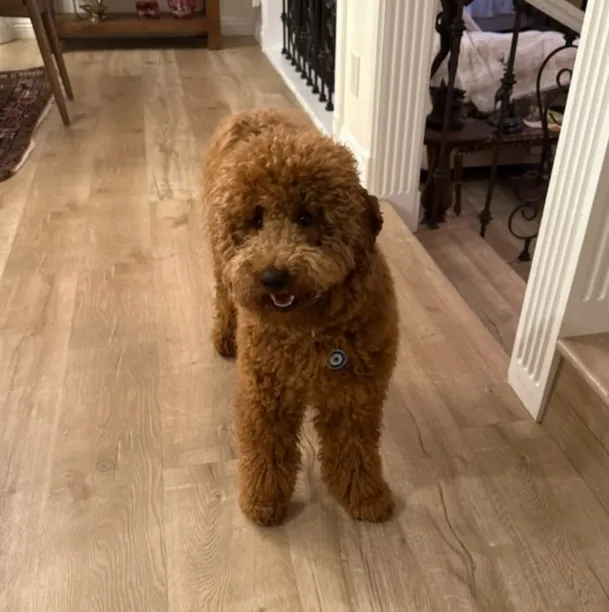The idea of bringing a “Teddy Bear Miniature Poodle” into your home evokes images of an adorable, fluffy companion. These charming canines, known for their plush appearance and intelligent eyes, have captured the hearts of countless dog lovers. But what exactly is a “Teddy Bear Miniature Poodle,” and how do you go about finding one that’s a perfect, healthy fit for your family? This guide from Dog Care Story delves into everything you need to know about this delightful breed, from understanding their unique qualities to navigating the search for a reputable source. If you’re looking for a delightful and intelligent companion, the Miniature Poodle in a teddy bear style might just be your ideal match.
 Happy Miniature Poodle puppy with a soft, curly coat.
Happy Miniature Poodle puppy with a soft, curly coat.
What Exactly is a “Teddy Bear Miniature Poodle”?
The term “Teddy Bear Miniature Poodle” can sometimes be a little misleading. It’s important to understand that “Teddy Bear” refers to a popular grooming style, not a distinct breed. The Miniature Poodle is a purebred dog recognized by the American Kennel Club (AKC), celebrated for its intelligence, elegant gait, and distinctive curly coat. When someone refers to a “Teddy Bear Miniature Poodle For Sale,” they are typically looking for an AKC-registered Miniature Poodle that has been or can be groomed in the adorable, rounded “teddy bear” clip. This haircut accentuates their cute, fluffy faces and gives them an irresistibly cuddly appearance.
Miniature Poodles are part of a proud lineage, often coming from AKC Champion Lines known for happy and family-friendly temperaments. These Poodles are not just beautiful; they are a truly family-oriented dog, known for their affectionate and playful nature.
Why Choose a Miniature Poodle? Unmatched Qualities
Poodles consistently rank #1 in multiple categories, distinguishing them as exceptional companions. Their unique combination of intelligence, trainability, hypoallergenic qualities, and versatility makes them stand out among all dog breeds.
Intelligence and Trainability: Top of Their Class
Poodles are renowned for their sharp minds, consistently ranking as one of the smartest dog breeds. This high intelligence translates into exceptional trainability. They are eager to please and quick to learn, making them a joy to train in obedience, tricks, and even advanced canine sports. Their intuitive nature means they often pick up on cues quickly, forming a deep bond with their owners. This makes them ideal for first-time dog owners and experienced handlers alike. For an active, intelligent dog like the Miniature Poodle, providing appropriate mental stimulation is crucial. Consider durable chew toys to keep them engaged, especially if they enjoy vigorous play.
Hypoallergenic Coat: A Dream for Allergy Sufferers
One of the most appealing characteristics of the Poodle is its curly, non-shedding coat, making them an excellent choice for individuals with allergies. Unlike many breeds that shed dander and hair, Poodles produce minimal dander, which is the primary trigger for dog allergies. This “hypoallergenic” quality means they are often well-tolerated by allergy sufferers, allowing more people to experience the joy of dog ownership. Their unique coat requires regular grooming, but the benefit of less shedding in the home is invaluable.
 Adorable red Miniature Poodle puppy looking playful.
Adorable red Miniature Poodle puppy looking playful.
Versatility and Temperament: The Ultimate Family Companion
Poodles are celebrated for their versatility, coming in a range of sizes to suit various living situations. While our focus here is on Miniature Poodles, it’s worth noting the full spectrum:
- Standards: 50 – 80 lbs
- Moyens: 20 – 40 lbs (often called “medium” Poodles)
- Miniatures: 12 – 18 lbs
- Toys: 5 – 8 lbs
- Teacups: 4 lbs or less
Miniature Poodles, typically weighing between 12-18 pounds, offer a perfect balance – they are small enough for apartment living but robust enough to enjoy active play. They are exceptionally intuitive, active, loyal, comical, playful, and loving cuddle bugs. This makes them truly wonderful family members who thrive on interaction and affection. Their natural comical nature and willingness to please also made them a favorite for circus dog acts for centuries!
Navigating the Search: Where to Find a Teddy Bear Miniature Poodle for Sale
When searching for a “teddy bear miniature poodle for sale,” your primary goal should be to find a healthy, well-socialized puppy from a responsible source. This typically means working with a reputable breeder.
Choosing a Reputable Breeder: Your Key to a Healthy Puppy
A reputable breeder prioritizes the health and temperament of their dogs above all else. Here’s what to look for:
- AKC Registration: Ensure the puppies are AKC-registered, indicating purebred lineage and adherence to breed standards.
- Health Clearances: Reputable breeders conduct extensive health testing on parent dogs for genetic conditions common in Poodles, such as hip dysplasia, progressive retinal atrophy (PRA), and patellar luxation. They should be transparent and willing to share these results.
- Meet the Parents: You should be able to meet the puppy’s parents to assess their temperament and living conditions.
- Clean and Loving Environment: Puppies should be raised in a clean, stimulating home environment, not in outdoor kennels or puppy mills.
- Contract and Guarantees: A good breeder will provide a written contract, health guarantee, and a spay/neuter agreement.
- Support and Resources: They should be a lifelong resource for questions and advice.
- Referrals: Ask for references from other puppy buyers and their veterinarian.
Red Flags to Watch Out For: Avoid breeders who sell multiple breeds, don’t allow you to visit their facility, don’t perform health testing, or pressure you into a sale. These are often signs of puppy mills or irresponsible breeding practices. For their mental and physical well-being, all dogs, including Miniature Poodles, benefit from interactive play. Providing appropriate toys can help manage their energy levels and prevent destructive behaviors, making a selection of the best toy for dogs that destroy toys a thoughtful consideration.
 Fluffy Miniature Poodle puppy with a classic teddy bear cut.
Fluffy Miniature Poodle puppy with a classic teddy bear cut.
Understanding Pricing for a Miniature Poodle
The price for a “teddy bear miniature poodle for sale” can vary significantly based on factors such as:
- Breeder Reputation and Experience: Established breeders with a history of producing healthy, well-tempered puppies often charge more.
- Parental Lineage: Puppies from AKC Champion lines with extensive health testing will be at the higher end.
- Health Clearances: The cost of thorough health testing is factored into the puppy’s price.
- Location: Prices can vary regionally.
- Included Services: Some breeders include initial vaccinations, microchipping, or a starter puppy pack.
Expect to pay a premium for a well-bred Miniature Poodle, as this investment covers the breeder’s dedication to health, socialization, and ethical practices. When considering the initial cost, remember that it’s an investment in a healthy, long-lived companion.
Purebred Miniature Poodles vs. “Doodles”: The Original vs. The Imitation
The Poodle’s popularity has led to a surge in “Poodle mixes” known as “Doodles,” “Oodles,” or “Poos.” While these mixes often inherit the Poodle’s fluffy face and curly coat – the very characteristics that define purebred Poodles – it’s crucial to understand the distinction.
The fluffy face and curly coat are natural characteristics every purebred Poodle is born with. These features are why Poodles have been styled in the “Teddy Bear haircut” since the 16th Century – they are the original Teddy Bear Dog. Many people fall in love with these traits, leading them to seek out Doodles. Interestingly, the most prized of all Doodle-type dogs is often the F1b, which is 3/4 Poodle. This highlights the inherent desirability of the Poodle’s genetic contribution.
The original article makes a strong point: “Let’s say you decided you wanted to buy something really special, and you had your eye on a beautiful gemstone. But a salesman offered you a piece of costume jewelry that ‘looks like’ the gemstone you like. Would you pay the same price for the costume jewelry as you would for the genuine gemstone?” This analogy perfectly illustrates the concern with purchasing mixed breeds for the price of a purebred. While each to their own, it’s important not to be swayed by fads without understanding the genetics and potential health outcomes. When you compare all the qualities of mix breed dogs to the purebred Poodle, none of these mixes truly come close in terms of predictable temperament, health, and conformation. Poodles rank #1 of all Teddy Bear Dogs and have held this position for hundreds of years. Investing in durable chew toys can be a smart move for any dog owner, as it protects your belongings and provides essential enrichment.
 Close-up of a Miniature Poodle puppy's soft, curly fur in a teddy bear style.
Close-up of a Miniature Poodle puppy's soft, curly fur in a teddy bear style.
Daily Care and Companionship for Your Miniature Poodle
Bringing a Miniature Poodle home is a commitment that involves dedicated care to ensure their well-being and happiness.
Grooming Your Teddy Bear Poodle
The Poodle’s non-shedding coat, while wonderful for allergies, requires consistent grooming. Regular brushing (2-3 times a week) is essential to prevent mats and tangles. Professional grooming every 4-6 weeks will maintain their “teddy bear cut,” keep their coat healthy, and prevent skin issues. This includes bathing, clipping, nail trims, and ear cleaning.
Diet and Exercise Needs
Miniature Poodles thrive on a high-quality, balanced diet appropriate for their age, size, and activity level. Consult your veterinarian for specific dietary recommendations. While they are small, Miniature Poodles are energetic and intelligent. They need daily exercise, including walks and playtime, to stay physically fit and mentally stimulated. Engaging them with challenging toys or training sessions can prevent boredom and destructive behaviors. For dogs that are particularly vigorous, considering kong extreme dog toys strong chewers can be a great way to provide long-lasting entertainment.
Health Considerations
Like all breeds, Miniature Poodles can be prone to certain health conditions. Reputable breeders screen for these, but it’s important for owners to be aware of potential issues such as:
- Patellar Luxation: A condition where the kneecap dislocates.
- Progressive Retinal Atrophy (PRA): A group of degenerative diseases affecting the retina.
- Addison’s Disease: An endocrine disorder.
- Epilepsy: A neurological disorder causing seizures.
Regular veterinary check-ups are crucial for early detection and management of any health concerns. A healthy lifestyle, including a good diet and exercise, will contribute significantly to your Poodle’s longevity and quality of life. For active Poodles, having a variety of durable rope toys for active chewers can be a great way to encourage healthy play and reduce anxiety.
Consider Adoption: Saving a Life
While the search for a specific “teddy bear miniature poodle for sale” often leads to breeders, please consider the option of adoption. Unfortunately, many mixed-breed Poodles and other mixes end up in shelters. These “Doodles” became a fad, leading to inexperienced people breeding them and selling them to individuals who haven’t fully considered the responsibilities of dog ownership. This often results in these precious pups being abandoned. If you are open to a mixed breed or even a purebred Poodle in need of a home, please consider adopting from a shelter or breed-specific rescue. The price is minimal, and the reward of saving a precious life is immeasurable. You can often find wonderful, deserving dogs eagerly waiting for a loving family.
Conclusion
The “Teddy Bear Miniature Poodle” is a truly special companion – intelligent, affectionate, and relatively allergy-friendly. By understanding their unique qualities and committing to responsible ownership, you can ensure a fulfilling life together. Whether you choose to find a reputable breeder or consider adopting a Poodle in need, prioritize the health, temperament, and well-being of your future furry family member. Make sure to do your research, ask the right questions, and prepare your home for a lifetime of joy with your Poodle. For more in-depth information on dog care, training, and choosing the right products for your pet, continue exploring Dog Care Story.
